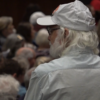April 8, 2014. Tampa Bay Times.
TAMPA — Soon after the Hillsborough Organization for Progress and Equality greeted a crowd of nearly 300 people Tuesday night, the Rev. Doak Mansfeld laid down the ground rules.
There would be three issues for everyone here to tackle, he said: affordable housing, job opportunities for people with criminal records and finding ways to reduce the number of juveniles arrested in Hillsborough County.
With a yes-or-no question, HOPE members would ask the elected officials and decisionmakers present whether they would work to tackle the issues, too.
A no would earn silence from the audience, said Mansfeld, from the Unitarian Universalist Church of Tampa. No booing. No heckling. Just silence.
But a yes, a promise to act and find solutions, should draw cheers from the crowd, he said.
“We walk different ways, but we come together for justice,” Mansfeld said.
A more just society is the goal of HOPE, an interfaith group that hosts the annual Nehemiah Action Assembly, which this year brought representatives from the county and city to Mount Calvary Seventh-day Adventist Church to answer questions and offer suggestions.
Two mothers, both employed full time, talked of their struggles to find safe housing for their families and make the rent each month earning less than $15 an hour.
The Rev. Paul Buster, who has been a pastor at New Macedonia Missionary Baptist Church for 12 years, spoke of his arrest more than 20 years ago, a felony charge after driving with a suspended license several times.
“The mature man you see today is not that immature young man,” he said. But not so on job applications.
“I’m still a convicted felon,” he said.
HOPE voted at a convention in October on which issues to tackle. Affordable housing was a major priority. More than 75 percent of low-income households in the county pay more than 40 percent of their income for housing, members said, citing a 2013 study by the Shimberg Center for Housing Studies at the University of Florida.
In addition to creating a trust fund for affordable housing for low-income families, HOPE also proposed an amendment to the Tampa Criminal History Screening Practices Ordinance that would give people with criminal records a better chance at getting a foot in the door at companies that contract with the city.
They also want to see law enforcement and county justice agencies work to reduce the number of juveniles arrested in Hillsborough each year. The civil citation program for first-time juvenile offenders has made inroads, they said, offering nonviolent offenders intervention programs. But not all children eligible for civil citations in the past year received them, members said.
Commissioner Les Miller said he is open to the idea of creating a trust fund for affordable housing in Hillsborough. HOPE’s vision sees that funding coming from public sources, though Miller said a mix of public and private funding would be more likely.
Tampa City Council members Frank Reddick and Lisa Montelione said they supported the amendment to the city’s criminal history screening ordinance and would work to bring a motion forward.
Representatives from the Hillsborough County Sheriff’s Office, the Tampa Police Department, the State Attorney’s Office and others involved in juvenile justice said they would work with HOPE on its last initiative.
Maj. Diane Hobley Burney of the Tampa police asked HOPE to make a promise, as well — that it would serve as a resource to families.
“We do not discipline,” she said. “That’s the parents’ job.”





